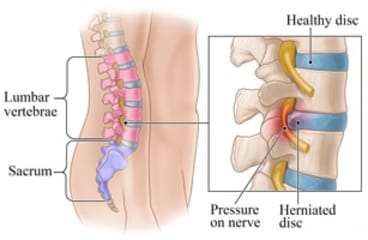
Microdiscectomy: What is it?
Microdiscectomy is surgery to remove part or all of a bulging or damaged (herniated) disc in the spine. A herniated disc in the low back (from the first lumbar vertebra to the sacrum) is called a lumbar herniated disc. If it irritates or presses on the spinal nerves, it can cause pain and numbness in the buttock and leg.
Surgery is done to stop the pressure on the nerves. This may help with pain and numbness. And it may help you move better. It will also help prevent further damage. Some people notice that their symptoms improve very soon. But your back may feel stiff and sore for a few weeks.
A doctor or nurse will give you medicine to make you sleep. You will not feel pain during the surgery.
Your doctor makes a 1- to 2-inch cut in the skin over the spine. This cut is called an incision. The doctor uses a microscope (scope) and surgical tools to remove a small amount of bone and other tissues around the bulging disc. Then your doctor removes the bulging part of the disc. You will have a small scar on your back. It will fade with time.
You will be asleep for the surgery. You might go home the same day you have surgery. Or you might need to stay in the hospital or surgery center overnight. If you work in an office, you may go back to work in a week or two. If your job requires physical labor (such as lifting or twisting), you may be able to go back to work in 4 to 8 weeks. Your doctor may also suggest physical therapy and home exercises.
How do you prepare for surgery?
Surgery can be stressful. This information will help you understand what you can expect. And it will help you safely prepare for surgery.
 Preparing for surgery
Preparing for surgery
- You may need to shower or bathe with a special soap the night before and the morning of your surgery. The soap contains chlorhexidine. It reduces the amount of bacteria on your skin that could cause an infection after surgery.
- Be sure you have someone to take you home. Anesthesia and pain medicine will make it unsafe for you to drive or get home on your own.
- Understand exactly what surgery is planned, along with the risks, benefits, and other options.
- Tell your doctor ALL the medicines, vitamins, supplements, and herbal remedies you take. Some may increase the risk of problems during your surgery. Your doctor will tell you if you should stop taking any of them before the surgery and how soon to do it.
- If you take a medicine that prevents blood clots, your doctor may tell you to stop taking it before your surgery. Or your doctor may tell you to keep taking it. (These medicines include aspirin and other blood thinners.) Make sure that you understand exactly what your doctor wants you to do.
- Make sure your doctor and the hospital have a copy of your advance directive. If you don't have one, you may want to prepare one. It lets others know your health care wishes. It's a good thing to have before any type of surgery or procedure.
What happens on the day of surgery?
-
Follow the instructions exactly about when to stop eating and drinking. If you don't, your surgery may be canceled.
-
If your doctor has told you to take your medicines on the day of surgery, take them with only a sip of water.
-
Take a bath or shower before you come in for your surgery. Do not apply lotions, perfumes, deodorants, or nail polish.
-
Do not shave the surgical site yourself.
-
Take off all jewelry and piercings. And take out contact lenses, if you wear them.
At the hospital or surgery center
-
Bring a picture ID.
-
The area for surgery is often marked to make sure there are no errors.
-
You will be kept comfortable and safe by your anesthesia provider. You may be asleep or have medicine to relax you. And the area will be numbed if you're awake. It's often numbed even if you are asleep.
-
The surgery will take about 1 to 2 hours.
When should you call your doctor?
- You have questions or concerns.
- You don't understand how to prepare for your surgery.
- You become ill before the surgery (such as fever, flu, or a cold).
- You need to reschedule or have changed your mind about having the surgery.
Where can you learn more?
Go to http://www.healthwise.net/patientEd
Enter V995 in the search box to learn more about "Microdiscectomy in the Low Back: Before Your Surgery".
Current as of: July 24, 2025
Author: Ignite Healthwise, LLC Staff
Clinical Review Board
All Ignite Healthwise, LLC education is reviewed by a team that includes physicians, nurses, advanced practitioners, registered dieticians, and other healthcare professionals.

